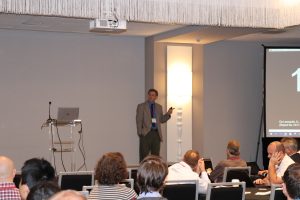InTrans / Oct 09, 2019
Traffic and Safety Forum highlights safety culture

Jay Otto, a research scientist for the Center for Health and Safety Culture in the Western Transportation Institute at Montana State University, discusses misperceptions about traffic safety at the Traffic and Safety Forum.
Perception is everything when it comes to traffic safety, and creating a culture of health and safety in communities.
However, according to this year’s Traffic and Safety Forum keynote speaker Jay Otto, there are a huge number of misperceptions when it comes to driver behavior, and those misperceptions are impacting decision-making throughout society.
“We’ve made huge strides over the decades on public and safety; we’ve gotten better and better, and we will continue to get better and better, but the public may not know that, and we need them to understand we can absolutely make a difference,” said Otto, a research scientist for the Center for Health and Safety Culture in the Western Transportation Institute at Montana State University.

Otto made the case during the forum, held at the Renaissance Savery Hotel in downtown Des Moines on Oct. 2, that work remains in challenging the beliefs people hold on traffic safety. He listed many examples where those surveyed reported their own safe behavior but had the perception that others didn’t follow those same behaviors.
While Otto focused on shifting the values, attitudes, and beliefs, in communities as a whole, the other presentations during the day-long conference highlighted the ways that departments of transportation (DOTs), cities, counties, and researchers are working in their own individual communities to create a culture of safety.
Those talks ranged from improving work zone performance to increasing complete streets projects to reaching young drivers.
Iowa Department of Transportation Traffic and Safety Bureau Director Steve Gent added to Otto’s presentation by discussing the statistics in Iowa. He stressed that the state does a good job on the infrastructure part of building a safety culture but agreed much more remains on the behavioral aspects.
“Right now we’re looking at about 45 percent of fatalities being unbelted, and yet 94 percent of people are belted,” Gent said. “If we’re ever going to get to zero, we need to be dealing with the safety culture aspects.”
The Traffic and Safety Forum is an annual event organized and hosted by the Iowa DOT and the Institute for Transportation at Iowa State University. The purpose of the forum is to enable traffic and safety engineering professionals to learn about new and innovative systems and processes, share individual experiences, and collectively address issues of interest.